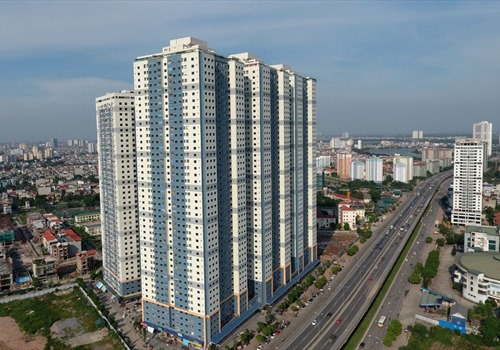 Economy
Economy

The Ministry of Construction (MoC) is completing a draft resolution to encourage the development of low-cost commercial apartments to submit to the Government in the third quarter of this year.

|
| Low-cost commercial apartment projects are expected to provide many preferential policies on land use fees, taxes and construction investment procedures. — Photo reatimes.vn |
HÀ NỘI — The Ministry of Construction (MoC) is completing a draft resolution to encourage the development of low-cost commercial apartments to submit to the Government in the third quarter of this year.
The move aims to help the real estate market recovery in the “new normal” context, said Nguyễn Văn Sinh, deputy minister of construction.
The low-cost commercial apartments would have self-contained designs with an area of less than 70sq.m and selling price of under VNĐ20 million per spq.m, The maximum value of an apartment must not exceed VNĐ1.5 billion (including VAT).
The resolution would provide many preferential policies on land use fees, taxes, construction investment procedures and capital mobilisation mechanisms to create favourable conditions for developers to invest in such projects. Homebuyers would have more opportunities to buy commercial housing at reasonable prices, helping address people's housing needs.
The Government has instructed to arrange an additional VNĐ1 trillion for the Viet Nam Bank for Social Policies and adding an additional VNĐ2 trillion to subsidise interest rates for four commercial banks designated by the State Bank of Việt Nam. The country has mobilised more VNĐ60 trillion to support estate developers to build social housing projects and lend to people in buying and renting such apartments.
The Government has amended and supplemented Decree No 100/2015/NĐ-CP on social housing development with favourable conditions by reserving 20 per cent of the total land fund for the projects. It also directed focusing on amending and supplementing Decree 101/NĐ-CP on renovating and rebuilding old apartment buildings in big cities to ensure safe accommodation.
Vũ Tiến Lộc, chairman of Việt Nam Chamber of Commerce and Industry (VCCI) said property had been an important sector to create jobs.
However, the COVID-19 pandemic has caused instabilities for the estate market in the first half of the year. Many real estate projects had to halt construction, foreign direct investment (FDI) inflows into the property sector sharply fell and the number of newly-established firms in the sector in the first six months of the year declined by 12 per cent from the same period last year. Many estate firms had to suspend operations and inventory in the property market has been on the rise.
In addition, Lộc said the overlap of the legal system in investment, construction and land management had been a major obstacle to increase real estate supply while demand for social housing was still high. To revive the market, it was necessary to promptly implement existing support packages, especially the medium and long-term credit support packages for important real estate projects. At the same time, it was necessary to promote reforms of mechanisms and policies on construction investment and real estate business in a more open and convenient manner.
Currently, the demand for low-cost housing projects has been high, especially in Hà Nội and HCM City. — VNS